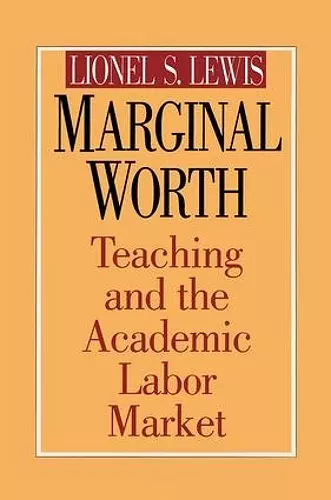Marginal Worth
Format:Paperback
Publisher:Taylor & Francis Ltd
Published:15th Mar '18
Currently unavailable, and unfortunately no date known when it will be back

In the American university system for most of this century, the academic reward system has been blamed for both the neglect of teaching and a glut of uninspiring research. The salaries for faculty at institutions that place special emphasis on teaching are lower than those for faculty at institutions where both teaching and research are expected. In Marginal Worth, Lionel S. Lewis examines the contemporary academic labor market to explain why teaching which is almost universally acknowledged both off and on campus to be at the center of the American educational experience is not at the center of the academic labor market, and why it is only modestly rewarded.
The evidence collected and analyzed by Lewis suggests that this is the case because teaching is not a particularly productive activity, and its quality is hard to measure. Teaching does not generate automatic prestige, most students do not learn a great deal, and in many instances other matters absorb the attention of faculty. Fifteen anonymous academic administrators and faculty members from around the country provided Lewis with the many letters, reports, and other documents he used in his analysis. By examining the material justifying merit salary awards, he reveals how merit is defined in academia. The focus of the letters is on teaching, research, administration, and service; teaching is not always seen as central to the academic role.
For several years and from all sides, American institutions of higher learning have been called to account for a variety of failures. Significantly, the one indictment most often heard is that classrooms have been abandoned for laboratories and libraries, where faculty pursue interests to further their careers. Lewis argues that restoring the balance between teaching and research is too simple a solution to the problem. We need to better understand how disciplinary and institutional reward structures affect teaching, how and why faculty allocate their tune, and why teaching appears to be neglected and underappreciated. Lewis applies tenets of the neoclassical labor market model to the academy, and considers what might be done to strike a better balance between expectations and circumstances in the academic marketplace. This candid look into the political economy of higher education will be enlightening reading for all concerned with the future of American higher education: professors, administrators, students, and parents.
ISBN: 9781138511880
Dimensions: unknown
Weight: 310g
162 pages